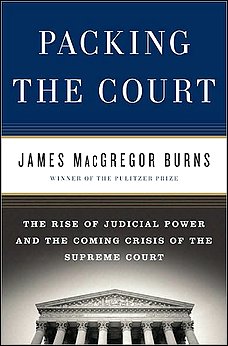THE LAW
Book Review: 'Packing the Court' by James MacGregor Burns
|
|
PACKING THE COURT
The Rise of Judicial Power and the Coming Crisis of the Supreme Court
By James MacGregor Burns
Penguin Press. 326 pp. $27.95
The history of the Supreme Court is too important to be monopolized by lawyers. It's a welcome development, therefore, that James MacGregor Burns, one of America's most distinguished historians of presidential power and leadership, has turned his attention to the Court. In many respects, "Packing the Court" is just what you would expect of Burns: a readable and accessible history, full of memorable details about the Byzantine nominations and political peculiarities of famous and obscure justices during the past two centuries. But "Packing the Court" also turns out to be a polemic, although an elegant and interestingly radical one.
Burns's thesis rests on a series of bold claims. "Most justices have been political activists -- party politicos," he insists, because "from George Washington to George W. Bush, the opportunity for presidents to pack the bench with loyalists . . . has been irresistible." From the beginning, Burns continues, the Court has established its "supremacy" over the president and Congress because of Chief Justice John Marshall's "brilliant political coup" in Marbury v. Madison (1803): asserting a power to strike down unconstitutional laws. By aggressively wielding this power, which Burns controversially claims that the framers never intended, the Court has become the "most unstable" branch of government, "as well as the most unrepresentative of all the people." What Burns calls "the unconstitutional obstacle of the judicial veto" can often "reduce Congress to helplessness and make bystanders of presidents."
Each of these claims is open to vigorous debate. Burns is too quick to equate Marshall's assertions about judicial review -- namely, the claim that the Court has the power to strike down unconstitutional laws -- with assertions about judicial supremacy -- namely, the far more controversial claim that the Court alone has the power to interpret the Constitution. In fact, in Marbury, Marshall defended judicial review, not judicial supremacy, which weakens Burns's argument that he engineered a "political coup" that would have appalled the framers. (The more conventional view is that judicial review was widely accepted by the time of Marbury.) And it wasn't until 1959 that the Court equated its own decision in Brown v. Board of Education with the "supreme law of the land."
Although Burns provocatively calls the judicial power to veto laws "unconstitutional," he is an inconsistent champion of judicial deference. At times, he seems to defend complete judicial abstinence, criticizing Felix Frankfurter, one of the most restrained justices in the 20th century, for occasionally striking down laws. But he also seems to applaud recent Court decisions that challenged President Bush in the war on terror. Then, just when you think Burns is attacking the Court for striking down liberal but not conservative laws and policies, he convincingly warns liberals that "looking to the Supreme Court for continuing liberal leadership was always a bad bet," because the Court over time has tended to be an enemy of progressive legislation.
Burns is part of an honorable bipartisan tradition of judicial restraint, associated most prominently with Justice Oliver Wendell Holmes. He criticizes what he calls the O'Connor Court as an "imperious court" that "reigned supreme over the political and constitutional landscape." But although Justice Sandra Day O'Connor was indeed an activist, judged by her willingness to strike down state and federal laws, her record challenges Burns's thesis that the Court has often "stood outside the mainstream of public opinion." It's arguable, for example, that O'Connor represented the views of the moderate majority of the American people -- fiscally conservative and socially moderate -- more accurately than the Gingrich Congress. More generally, Burns does not engage with the extensive legal and historical literature that suggests the Supreme Court has tended to reflect the views of the majority of Americans more often than to challenge them, and that on the rare occasions that it has produced anti-majoritarian rulings, the resulting backlashes usually produced a hasty judicial retreat.
Burns predicts that "within a generation or two -- perhaps much sooner" a "conservative, obstructionist" Supreme Court will once again confront a liberal president and Congress. He imagines that the "coming crisis" of his subtitle may arise as a pro-business Court composed of "formidable free-marketeers" strikes down progressive economic legislation. It's possible, but I wouldn't bet on it. The Roberts Court is indeed pro-business, but not especially libertarian: For this reason, among the current justices, only Clarence Thomas might be instinctively inclined to challenge President Obama's economic recovery program at its core. I'm similarly skeptical of Burns's extreme prescription for taming the Court: In a proposal he calls "momentous," "daring," "inspiring" and "risky," he suggests that the president should "announce flatly that he or she would not accept the Supreme Court's verdicts" unless the people pass a constitutional amendment explicitly authorizing the justices to strike down unconstitutional laws.
Barack Obama, a former constitutional law professor, seems to have a more measured view of the role the Supreme Court has tended to play in American democracy: ratifying social change that has emerged from political activism, rather than unilaterally causing or obstructing change on its own. But although I wasn't convinced by Burns's prescriptions for the very real problem of judicial supremacy, I was engaged, entertained and provoked by this surprising and energetic history of the Court.
Jeffrey Rosen, a law professor at George Washington University, is the author of "The Supreme Court: The Personalities and Rivalries that Defined America."
